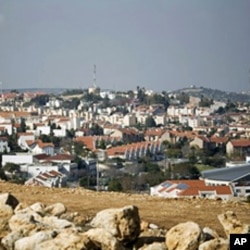While President Obama and other world leaders acknowledge that the Arab uprisings bring with them much uncertainty, they emphasize that the upheavals also can present new diplomatic opportunities. Mr. Obama spoke of those opportunities during a recent meeting in Washington with Israeli President Shimon Peres.
"I think he [Peres] and I both share a belief that this is both a challenge and an opportunity - that with the winds of change blowing through the Arab world, it’s more urgent than ever that we try to seize the opportunity to create a peaceful solution between the Palestinians and the Israelis," said the president.
Peace talks between Palestinians and Israelis have been held intermittently since the 1967 Middle East war when Israel captured the West Bank from Jordan, the Golan Heights from Syria and the Sinai Peninsula from Egypt. Israel withdrew from Sinai after a 1979 peace accord with Egypt, but has been occupying the West Bank and Golan Heights to this day.
The latest proposal to break the deadlock comes from a group of former Israeli defense officials who call for using the old 1967 borders as a basis for negotiations. Similar ideas have been proposed in the past, but all of them have failed.
David Makovsky is director of the Project on the Middle East Peace Process at the Washington Institute for Near East Policy. He says vigorous U.S. diplomacy will be the key to taking advantage of any opportunities presented by the Arab uprisings.
"I think the best way to do it is for the U.S. to synchronize diplomacy. We have not been out in the region since December and we should go out there and say we need you [Palestinians] to cross the threshold, and we need you [Israelis] to cross the threshold," said Makovsky. "Each side I think is more likely to cross a historic threshold if it knows the other side is going to reciprocate. So there needs to be synchronization and I think only the U.S. is capable of doing this."
Whatever the U.S. role, Samer Shehata, a professor of political science at Georgetown University, worries that Israeli leaders may want to put a hold on peace talks with the Palestinians until the political situation in the Arab world settles down. After that, Shehata says, prospects for peace talks could be much better.
"One of the primary obstacles to achieving success in terms of negotiations and in terms of a lasting, just peace in the region has been the tremendous asymmetry of power between the Israeli side and the Arab side and the Palestinian side in particular," said Shehata. "In medium and longer term, with the new reality established and hopefully the balance of power quite different than what it is now presently, there will be greater incentive for Israel to seek a just and lasting peace in the region."
But Ziad Asali, president of the American Task Force on Palestine, is not so optimistic. He says Israel’s policy of expanding Jewish settlement in the occupied territories continues to be an obstacle to successful peace negotiations.
"Barring something unexpected, unusual, like a major initiative by Obama or something like this, I think there is a high possibility that the Palestinians will come to the U.N. General Assembly in September and ask for a recognition of the state of Palestine," Asali said.
One point on which most regional experts agree is that the uprisings sweeping through the Arab world could have a huge impact on the possibility of peace between Israelis and Palestinians. Whether that impact is positive or negative depends, they say, on what kind of governments emerge from the current turmoil.





